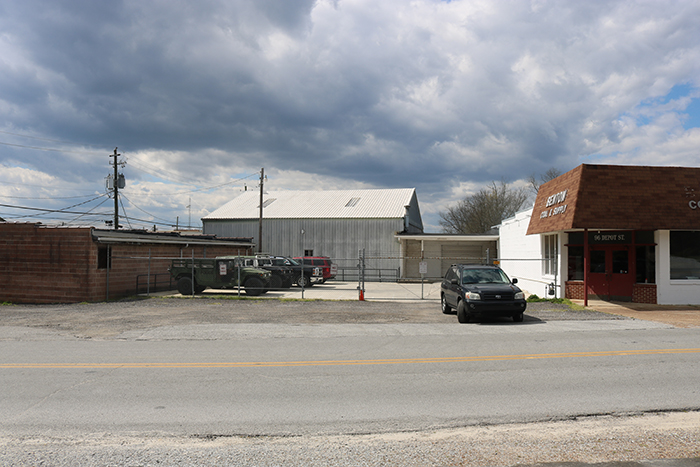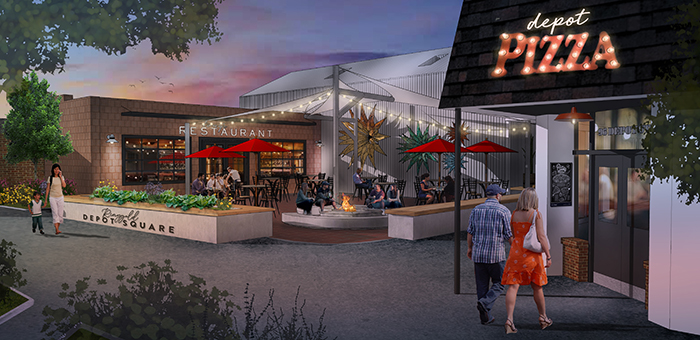The adage that good things come to those who wait is apparent in Ringgold. The town of nearly 3,500 nestled in the foothills of the northwest Georgia mountains is booming thanks to an influx of grants awarded in part because of a Renaissance Strategic Vision and Plan (RSVP) completed by the UGA Institute of Government in 2017.
“We’re getting ready to spend about $4 million or more on our downtown based on the plan we developed with UGA and trying to make it come to fruition,” said Mark Vaughn, city manager. The city is ready to share the news of its success with a promotional video showcasing RSVP plans and renderings.
In its 10th year, the RSVP is a unique process created at the University of Georgia that helps communities across Georgia re-envision their downtowns, invigorate citizen involvement and jumpstart economic development. Each RSVP results in a thoroughly researched and visually compelling document that illustrates the community’s vision for the future and provides the steps to getting there.
The Ringgold investment—which includes $1.4 million from the Georgia Department of Community Affairs (DCA), $750,000 from the Appalachian Regional Commission and $100,000 from the Lyndhurst Foundation—has spurred the city to move quickly on plans that languished during the coronavirus pandemic.
Vaughn said having a ready-made plan was helpful in seeking funding when the economy started churning again.
“The RSVP provides a framework and vision in tangible form. The expertise and imagination provided by the UGA Institute of Government really opens your eyes to the possibilities for your community,” he said.

A parking lot provides a blank canvas for potential redevelopment.
A detailed, attainable plan is also an important factor for funders like Lyndhurst, a family foundation based in nearby Chattanooga that regularly supports downtown development revitalization initiatives by partnering with UGA.
Macon Toledano, Lyndhurst’s associate director, said having the RSVP in place was a great advantage for Ringgold because it was fully prepared to move forward with key opportunities identified by the community in the planning process.
“The city took the initiative to develop engineering documents for key infrastructure needed to support projects within the plan,” he explained. “When funding opportunities arose, they had projects that were shovel-ready, documented and outlined in the downtown plan as part of the community’s vision.”
In addition to its funding success, Ringgold is also being noticed for its forward-thinking. Last year it was designated a Rural Economic Development Zone by the DCA and the Georgia Department of Economic Development. Ringgold also received a Visionary City Award from Georgia Trend magazine and the Georgia Municipal Association.
Robust commercial development radiating from exits off of Interstate 75 has been good for growth but also propelled the need to preserve Ringgold’s small-town appeal, said Dan Wright, manager of Catoosa County.
“The industrial presence we have creates a lot of good paying jobs for our citizens and resources for visitors. And those people, whether they’re staying in the hotels or working in industries, love visiting a vibrant downtown,” he said.
Wright, who served as Ringgold city manager for 25 years before moving into his current position in 2021, attributes the city’s success to several “local champions” who purchased and renovated downtown buildings after a tornado destroyed much of the town in 2011. That private investment resulted in more public funding—changing both the dynamics of the town and attitudes toward economic development.
“I always asked, ‘If we don’t believe in making investments in our own town, do we really expect a private company to do it?’” he said.
Forging such public-private partnerships is a desired outcome of the RSVP process. But equally important is the concept of placemaking, according to the Institute of Government’s Danny Bivins, UGA faculty lead for the Ringgold project.
“The number one thing I hear from communities is the desire to have a connected place where the local community can gather and see each other,” he said. “These projects, big and small, came from community public input. Now with grant funding, the city will move forward on site-specific development like Depot Square.”
Focused on Ringgold’s traditional railroad warehouse area, the Depot Square and Benton Coal projects reflect the community’s rich history and charm and are key to setting the tone for future growth.
“The public input process was transformative for our community. It’s really making downtown come alive and truly being what our city needs and not just one person’s idea,” said City Manager Vaughn.
